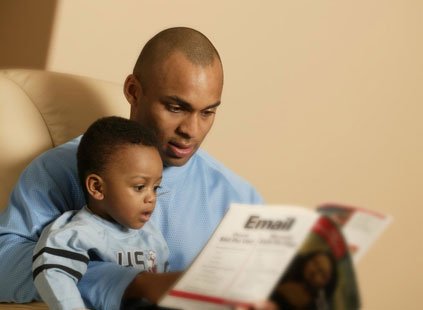While a 2012 federal government survey revealed that 15 million American children live without a father; a stark increase over a 1960 study that showed just 11 percent lived in homes without a dad, a new report shows black fathers are more involved than any other group.
Officials at the Centers for Disease Control and Prevention’s National Center for Health Statistics in Atlanta, say by most measures, black fathers have proved to be just as involved with their children as other dads in similar living conditions. The latest study prompted the Los Angeles Times to note that the results, “defy stereotypes about black fatherhood” because CDC officials found that African American dads are more involved with their children on a daily basis than fathers from any other racial group.
“It sort of reminds me of when ‘The Cosby Show’ debuted 30 years ago. Some people, accustomed to seeing black folks in subservient or clownish roles, didn’t think it was realistic enough,” said James Ragland, a columnist for the Dallas Morning News in Texas. “But all around me, even in my rural small town, there were plenty of families modeling the same parenting behavior— stable homes, disciplined children, caring parents. Yes, there still are too many broken homes and too many fathers not living with their children, especially in the black community. But it’s high time to put this myth about the absent black father to rest.”
Ragland noted that while his own father had faults, being absent wasn’t among them.
In fact, Ragland says that while his father shot hoops with him and his brothers, played baseball with the entire family and took the children for ice cream treats on Fridays, he didn’t think his father had done anything exceptional because he saw other fathers engaging their kids the same way.
The CDC’s report further revealed that nearly half of black fathers living apart from their young children said they played with them at least several times a week, 42 percent said they fed or ate with them that frequently, and 41 percent said they bathed, diapered or helped dress them as often— rates on par with or higher than those of other men living apart from their kids.
“People think they don’t care, but we know they do,” said Joseph Jones, president of the Center for Urban Families, a Baltimore advocacy group that works with African-American fathers. “We see how dads are fighting against the odds to be engaged in the lives of their children.”
Earlier research by the CDC showed that after parents break up, fathers become less involved as time passes. Researchers said mothers have tended to cut the time they allow an ex-mate to spend with their children while fathers sometimes struggled to stay as involved if they formed another family.
However, researchers also found that black fathers were more likely than white or Latino dads to stay close to their children after having more kids with a new partner.
“Because it isn’t as rare for black fathers to live away from the home, their communities might have stronger expectations that fathers will stay involved outside the package deal of a wife and kids,” said Laura Tach, one of the CDC researchers and a professor of policy analysis at Cornell University in New York.
In her new book, “Bet on Black: African-American Women Celebrate Fatherhood in the Age of Barack Obama,” author and editor Kenrya Rankin Naasel shines the spotlight on what she calls the exceptional black men who are doing right by their families.
“My daddy raised my little sister and me as a single father, so I’ve always experienced a kind of dissonance when it came to the way I saw black fathers portrayed and what I experienced at home,” Naasel said. “He has always been there in every way, physically when I was a kid and emotionally as an adult, that man has helped me through things no father should have to think about.”
